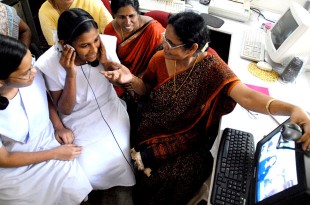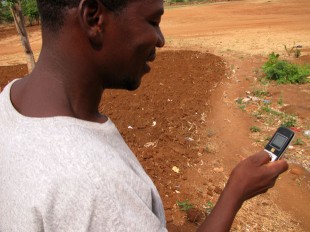It's no coincidence that promoting research in educational technology was the subject of our last blog post. In June 2014, DFID will publish a new evidence paper (or Topic Guide) exploring how Edtech can be used to improve teaching and learning in low and lower-middle income countries.
As the quality of teaching and learning still lags behind access to education and we look for ways to address the 'learning crisis', this is a critical time to assess the impact of educational technology over the past 10 years. Claims that Edtech will transform opportunities for children in low income countries must be evaluated better.
What is the Edtech Topic Guide?

The Edtech Topic Guide explores the relationship between educational technology, effective teaching, and learning achievement. It is the result of work shared between DFID, the Health and Education Advice and Resource Team (HEART), Tom Power of the Open University and Dr Niall Winters of the Institute of Education.
The guide brings together and analyses evidence from more than 80 studies from countries across sub-Saharan Africa, Asia and South America.
It aims to support government officials, education advisers, NGOs, academics and the private sector, to make better, evidence-based decisions about investing in and using Edtech to improve learning.
It includes 5 key research questions:
(1). What evidence (if any) is there that the use of educational technology by students has measurable or observable impact on students’ learning outcomes?
(2). What evidence (if any) is there that the use of educational technology by teachers has measurable or observable outcomes in changing teaching and learning processes for students?
(3). What evidence (if any) is there that the use of educational technology by students has measurable or observable outcomes in changing learning processes for students?
(4). What evidence (if any) is there that the use of educational technology by teachers has measurable or observable outcomes in changing students’ learning outcomes?
(5). What evidence (if any) is there that educational technology can effect change in school management and educational systems?
On the sidelines, we are also asking broader questions about the state of the evidence base:
- How should we evaluate Edtech programmes?
- Should we look for a causal relationship between Edtech and learning outcomes? If not, what should we measure?
- How can we improve edtech evaluations?

Bringing the Topic Guide together
After finalising the terms of reference for the guide, HEART conducted a literature search to give us a sense of the scope and quality of the literature around each thematic question.
The team then critically appraised each of the 80 chosen studies, using protocols set out in DFID’s Assessing the Strength of Evidence guidance.
We communicated regularly during this process to analyse our findings, share patterns emerging form the literature and discuss the strength of the evidence.
HEART subsequently drafted the guide and it is currently with DFID education advisors and non-DFID stakeholders for peer review.
Why we invested in the Edtech Topic Guide

While DFID has supported the integration of technology into education programs for some time, little effort has been made to gather and evaluate the evidence in a systematic way.
Some preliminary steps have been taken: in October 2013 HEART published the ICTs and Education Report, providing an overview of DFID’s Edtech programs.
While acknowledging from the outset that technology cannot and should not attempt to raise learning outcomes in isolation, the guide aims to produce a succinct analysis of Edtech programmes that have and have not been successful in raising learning outcomes.
It will provide DFID education advisors, government officials, school leaders and other stakeholders with timely evidence which evaluates how technology can improve learning.
Next steps
The Topic Guide will be published in June and will be available to download online. Findings will be disseminated widely, most immediately at the e-learning Africa Conference in Uganda in May.
Back in London, DFID and Cambridge Education will launch the guide on 4th June. If you would like more information about this event or the guide, please contact Rosalind Gater. We look forward to hearing your thoughts and comments on this important piece of work!
This post was co-authored by Grace Wood, Education Policy Officer at DFID and Rosalind Gater.
Keep in touch. Sign up for email updates from this blog, or follow Rosalind on Twitter.

Recent Comments